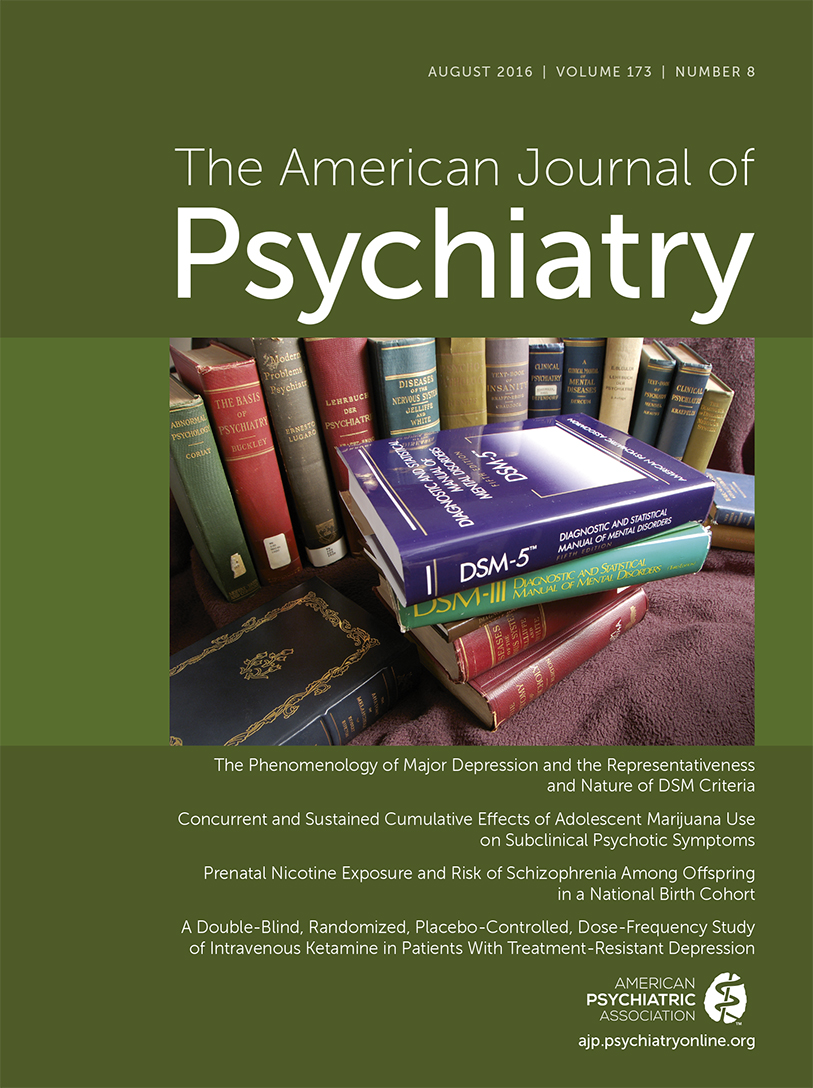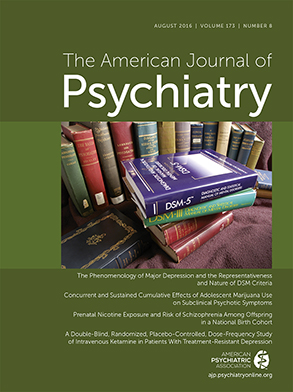T
o THE E
ditor: We thank Dr. Hieronymus and Dr. Eriksson for their interest and important critique of our recent meta-analysis examining the dose-response relationship of selective serotonin reuptake inhibitors (SSRIs) in major depressive disorder (
1). In this meta-analysis, we found a weak positive relationship between dosage and response rates across all SSRIs, which came at a cost of higher side effect burden as represented by an increased risk of dropout due to side effects. From the data, we suggest that dosage escalation of SSRIs represents a reasonable treatment strategy for depressed patients, especially those with limited response to low-dose SSRIs who experience few side effects.
Dr. Hieronymus and Dr. Eriksson point out with appropriate concern the incorrect representation that our meta-analysis included only fixed-dose trials. Previous research has suggested that, compared with fixed-dose trials, flexible-dose trials are indeed more likely to demonstrate significant benefits of antidepressant medications (
2). We believe that our methodology of including flexible-dose studies in the meta-analysis was fairly transparent in the original article, and we apologize for any missing language that we could have added to the methods or discussion section to highlight this methodological decision. We believe that the confusion regarding this point was promoted by an accompanying editorial rather than the actual article, but we welcome the opportunity to clarify this point and discuss this decision further.
We decided a priori to include both fixed- and flexible-dose trials in this meta-analysis because only a small proportion of placebo-controlled SSRI trials used a fixed-dose design. Of the 40 trials included in this meta-analysis, only 11 involved a fixed-dose design. The dearth of fixed-dose trials in the scientific literature on major depressive disorder is likely one of the primary reasons why an association between SSRI dosage and symptom response has never been previously demonstrated or disproven. The decision to include flexible-dose trials has been made by many previous research groups when examining dose-response relationships in antidepressant medications (
3,
4). Potential alternative approaches to examining dose-response relationships in meta-analyses, such as using individual patient data and comparing the association between maximum and actual dosages in flexible-dose studies, are extremely likely to be biased. The problem of using individual patient data occurs because subjects are titrated to increasing dosages of medications in flexible-dose trials based on efficacy and tolerability (not randomly); thus, subjects who respond early in treatment are likely to remain on lower dosages of medication, and those who do not respond have antidepressant dosages escalated. This practice creates a bias toward the null in examining dose-response relationships using individual patient data in flexible-dose trials, and it explains the phenomenon whereby placebo groups typically receive higher dosages (compared with the active group) in placebo-controlled trials of effective medications.
However, we believe that restricting the analysis only to fixed-dose trials would not have affected our conclusions. Based on the concerns raised by Dr. Hieronymus and Dr. Eriksson, we performed an additional sensitivity analysis where we restricted the analysis only to the 11 fixed-dose trials available. Where meta-analysis data were restricted to fixed-dose trials, we still found a significant effect of SSRI dosage for the longitudinal dose-response curve (log [week +1]=0.28, 95% CI=0.15–0.41, p<0.0001), as well as a significant interaction between dosage and time (interaction=0.0013, 95% CI=0.0002–0.0023, p=0.0183) and endpoint depression severity (β=0.0029, 95% CI=0.0014–0.0043, z=3.93, p=0.0001), but we did not find a significant likelihood of treatment response (β=0.0022, 95% CI=−0.0013 to 0.0057, z=1.24, p=0.22). (There was a larger estimate of effect of dosage than in the original meta-analysis, but it lost significance because of decreased power.)
Dr. Hieronymus and Dr. Eriksson also raised concern about our treatment of the paroxetine trial data in our meta-analysis, suggesting that the data included in our meta-analysis was exclusively based on two paroxetine trials registered in the GlaxoSmithKline (GSK) registry (GSK/29060/02 and GSK/29060/03). This concern highlights the difficulties in conducting meta-analyses on the larger antidepressant trials literature that often predates legislation requiring the registration of clinical trials on
ClinicalTrials.gov (with an associated unique trial identification number) and the practice of major scientific journals requiring clinical trial registration for publication. Prior to the establishment of
ClinicalTrials.gov, it was common in our field to have multiple publications of data from the same underlying clinical sample. In reviewing the GSK registry, we believe paroxetine trials included in this meta-analysis involved subject data from the following GSK trials: GSK/29060/06, GSK/29060/02/001–004, GSK/29060/03/001–006, as well as three other paroxetine trials that were not in the GSK trial database for various reasons (
5–
7). We did have difficulty definitively matching individual trials in this meta-analysis with individual trials in the GSK registry given the similarity of many study designs and the lack of identifying details in published articles. We conducted an additional sensitivity analysis excluding the one possible source of duplication identified—an article in our meta-analysis that may have reported on all six single-site GSK/29060/03 trials, some of which also may have been reported individually. This analysis did not significantly affect any of the underlying results of the review (
8).
We thank Dr. Hieronymus and Dr. Eriksson for their interest in our work. We also thank them for their thoughtful critiques of some of the limitations of our meta-analysis. We have appreciated the opportunity to respond to them.

